Best-known for her prophetic powers, within Greek mythology Cassandra is a princess of Troy who lived during the era of the Trojan War. Her gift of prophecy, however, was accompanied by a curse – no one believed in her prophecies, making her powerless to stop fate from running its course.
In the conventional versions of the myth, Cassandra received her gift of prophecy, as well as her curse, from the god Apollo. The disregard for Cassandra’s prophecies resulted in tragedies befalling those around her and a gut-wrenching fate for Cassandra herself. Cassandra of Troy is mentioned in the works of various Classical authors, including Homer, Virgil, as well as the Greek tragedians Euripides and Aeschylus.
Cassandra of Troy was cursed by Apollo for having rejected his sexual advances. ( Public domain )
Cassandra of Troy and the Wrath of Apollo
Cassandra was a daughter of Priam, the Trojan king, and his wife, Hecuba. According to Greek mythology, Priam fathered numerous children, although Cassandra was his most famous daughter. Cassandra had a twin brother, Helenus, who like his sister had the gift of prophecy. Unlike Cassandra, however, Helenus’ prophecies were believed. Ironically, perhaps, Helenus’ prophecies would help the Greeks win the Trojan War. Apart from that, Helenus’ fate after the war was the opposite of Cassandra’s, as he ultimately became a king in Greece.
According to the most popular version of the myth, Cassandra gained her prophetic abilities from Apollo, who, amongst other things, was the god of prophecies. Cassandra of Troy is said to have been the most beautiful of Priam’s daughters, and therefore received many suitors, both mortal and immortal. One of the gods whose attention Cassandra caught was Apollo. The myth continues with Apollo’s attempt to seduce the Trojan princess.
The god offered Cassandra the gift of prophecy, in exchange for sleeping with her. Cassandra readily accepts the gift, but then decided not to hold her end of the bargain, which greatly angered the god. Instead of simply taking back his gift from Cassandra, however, the furious Apollo laid a curse on her. As a result of this curse, Cassandra’s prophecies would be ignored. This meant that whilst Cassandra was able to see the terrible things that would happen in the future, she was powerless to do anything about them, since nobody believed her.
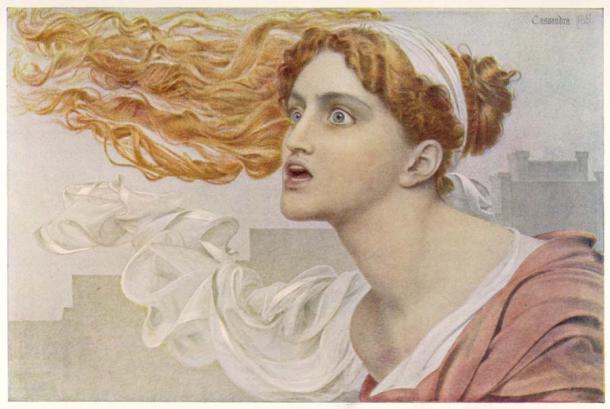
Cassandra of Troy, princess and prophetess. ( Archivist / Adobe Stock)
Different Versions of the Story of Cassandra of Troy
This version of the myth is seen, for instance, in Aeschylus’ Agamemnon, in which Cassandra tells her story in a dialogue with the chorus. In the play, Cassandra says that she “consented to Loxias (one of Apollo’s titles) but broke my word.” Consequently, “ever since that fault I could persuade no one of anything.”
Incidentally, in Euripides’ The Trojan Women , Cassandra is referred to by her mother Hecuba as “Phoebus’ virgin-priestess”, indicating that she was a priestess in the service of Apollo, and that she may have taken a sacred vow of chastity. This allows Cassandra’s rejection of Apollo’s advances to be viewed from a different perspective. In any case, despite the curse, it seems that it was possible for Cassandra to teach her prophetic skills to others. In one version of the myth, Cassandra is said to have taught her twin brother Helenus how to prophesy.
A less well-known version of the myth states that Cassandra and Helenus gained their powers of prophecy when they were still infants. According to the Scottish anthropologist Sir James George Frazer, this version of the myth was mentioned by several scholiasts. In other words, this story was probably added by later writers.
In this version, Cassandra and Helenus were left in the Temple of Apollo Thymbraeus one night whilst still babies. During the night, a pair of serpents emerged from the dark recesses of the temple, and went towards the babies. The serpents licked the ears of Cassandra and Helenus, which enabled them to hear the sounds of nature clearly, thereby granting them the oracular powers. Although the myth does not explain how Cassandra ended up being cursed by Apollo, it is assumed that she offended the god by rejecting his sexual advances, like in the better-known version of the myth.
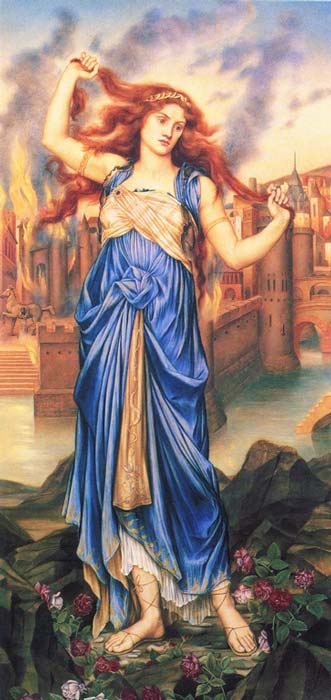
Cassandra of Troy by Evelyn de Morgan. ( Public domain )
The Consequences of Apollo’s Curse on Cassandra of Troy
Apollo’s curse would have dire consequences not only on Cassandra, but also on the whole of Troy. According to one myth, when her brother Paris was born, Cassandra predicted he would cause the destruction of Troy. Cassandra warned her family, and urged them to kill the baby. Since no one believed her, however, they left the baby alone. Nevertheless, prior to Paris’ birth, Hecuba, his mother, had a dream, in which she saw that she had given birth to a fire from which many serpents emerged. Aesacus, one of Cassandra’s half-brothers, was able to interpret this dream, having learned the art from Merops, his maternal grandfather.
Aesacus said the exact same thing as Cassandra, that Paris would cause the downfall of Troy, but since the people believed Aesacus, the baby was exposed in the wild. Paris, however, survived this ordeal, and became a shepherd. Eventually, it was Cassandra who recognized Paris when he had grown up, which enabled him to return to the royal palace in Troy and to be recognized by Priam as his son. This is somewhat ironic, considering that Cassandra, who had advocated Paris’ death when he was a baby, was also the instrument for his reinstatement as a Trojan prince.
Cassandra had a second opportunity to prevent Troy from being destroyed. When Paris was about to set sail for Sparta, Cassandra urged him not to go, prophesizing that he would bring back with him death and destruction. Needless to say, no one heeded Cassandra’s prophecy. Paris was travelling to Sparta with the intention of bringing home Helen, reputed to be the most beautiful woman in the world, but also the wife of Menelaus, the King of Sparta.
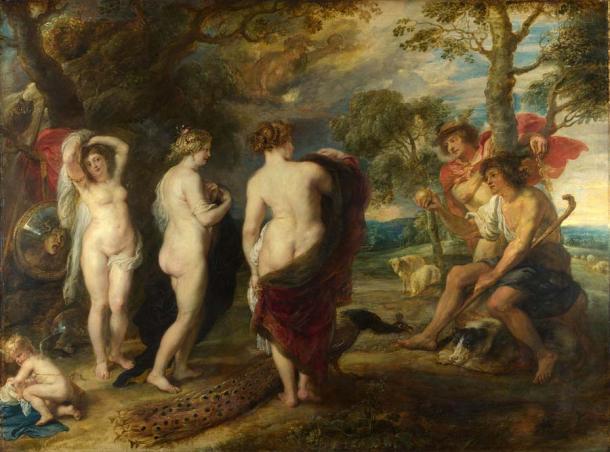
The Judgment of Paris by Rubens. ( Public domain )
The Judgment of Paris and the Golden Apple of Discord
Whilst he was still a shepherd, Paris was asked by three goddesses, Hera, Athena, and Aphrodite, to judge who amongst them should be given the golden apple as the fairest of all. This apple had been thrown amongst the gods by Eris, the goddess of strife and discord, whilst they were attending the wedding feast of Peleus and Thetis. As Eris had not been invited, she decided to take her revenge by throwing this golden apple to sow discord amongst the gods.
Zeus, the king of the gods, wisely decided not to settle the quarrel himself, as he knew that it would cause grave consequences. Therefore, he chose a mortal, Paris, who was on Mount Ida at the time, to be the judge. Each of the three goddesses promised Paris a gift if he gave the golden apple to her. This episode, known as the Judgment of Paris, concluded with Paris awarding the golden apple to Aphrodite, who had offered him the love of the most beautiful woman in the world.
Therefore, upon returning to Troy, Paris had only one thing one his mind – obtaining Helen. Cassandra’s prophesying was futile. Paris went to Sparta, abducted Helen, and brought her back to Troy. In one version of the myth, the Trojans were overjoyed when they saw Paris returning with Helen and warmly welcomed her. Whilst the Trojans regarded Helen’s presence as an enhancement of their city’s greatness, only Cassandra saw her for what she truly was – the city’s destroyer. Cassandra is said to have torn her hair, and flung away her golden veil when she saw Helen arriving in the city, but to no avail.
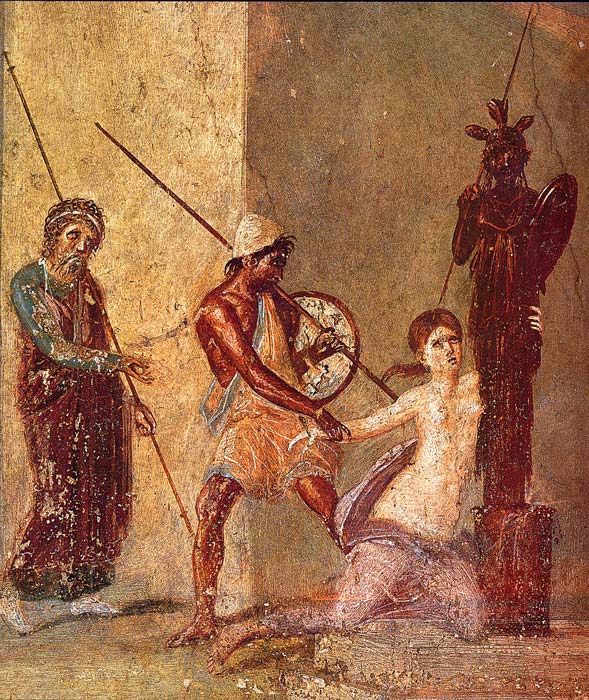
Roman fresco in Pompeii depicting scene when Cassandra clings to the Xoanon, the wooden cult image of Athene, while Ajax the Lesser is about to drag her away in front of her father Priam. ( Public domain )
Foretelling the Trojan War and the Rape of Cassandra
In due course, the Greeks arrived to fight under the walls of Troy for 10 long years. Eventually, Odysseus came up with the ruse known today as the Trojan Horse, which would ultimately gain victory for the Greeks. According to Quintus Smyrnaeus’ The Fall of Troy (known also as the Posthomerica), Cassandra used her prophetic abilities and foresaw that there were Greek warriors hiding inside the wooden horse.
Nevertheless, although she tried to warn the other Trojans, no one believed her. Moreover, the Trojans hurled insults at her. The refusal to believe Cassandra on the part of the Trojans would result in the destruction of their city. Ironically, Apollo, who had cursed Cassandra in the first place, was one of the gods who fought on the side of the Trojans.
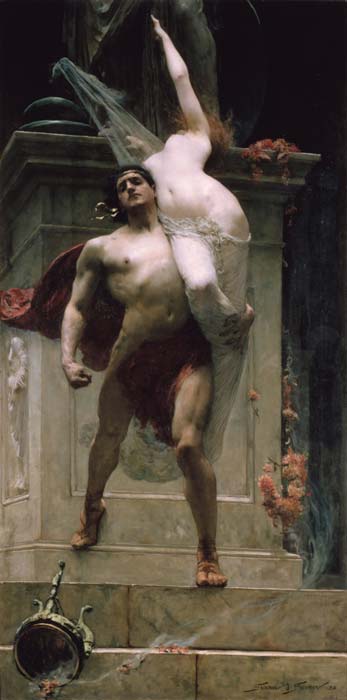
Ajax and Cassandra by Solomon Joseph Solomon. ( Public domain )
Following the sack of Troy, Cassandra was raped by Ajax the Lesser. This episode is recounted in Virgil’s Aeneid, as well as by Quintus Smyrnaeus. In the Aeneid, Cassandra is said to have been dragged by her hair from the Temple of Athena. The Trojans tried to rescue Cassandra to no avail, and many of them were killed, including Coroebus, who came to fight for the Trojans out of love for Cassandra.
According to The Fall of Troy , Ajax’s rape of Cassandra incurred the wrath of Athena, since she was a suppliant in her temple. This means that Ajax’s action was sacrilege. Although Athena displayed her fury, Ajax would not budge. “Yea, she would not look upon the infamy, but clad herself with shame and wrath as with a cloak: she turned her stern eyes to the temple-roof, and groaned the holy image, and the hallowed floor quaked mightily. Yet did he not forbear his mad sin, for his soul was lust-distraught.”
The Greek leaders failed to punish Ajax, which made Athena even more furious. Consequently, she decided to punish not only Ajax, but the rest of the Greeks who fought at Troy as well. She sought the help of Poseidon to stir the sea, thereby making their journey home difficult and dangerous. Athena also obtained permission from Zeus to use his lightning bolts on the Greek ships, while Zeus himself promised to send storms against them.
During one of these storms, Athena destroyed Ajax’s ship with a lightning bolt. Nevertheless, with Poseidon’s aid, Ajax managed to swim to a rock. According to the Odyssey, once he was safe, Ajax started boasting that even the gods could not drown him. This infuriated Poseidon, who split the rock Ajax was on with his trident. Ajax fell into the sea and was drowned.
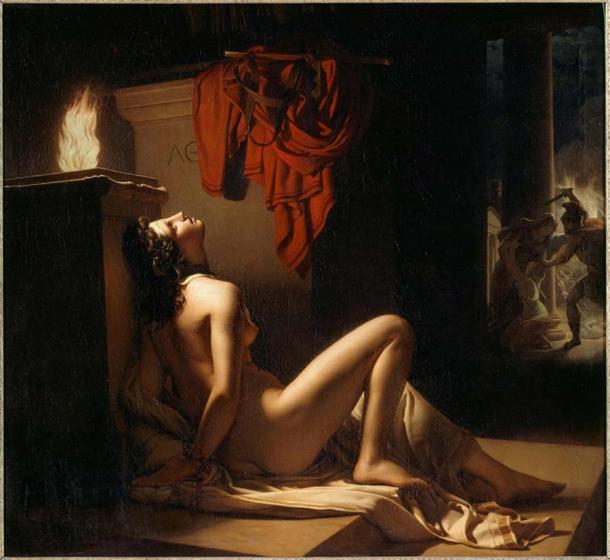
Cassandra of Troy imploring Minerva for vengeance against Ajax. ( Public domain )
The Tragic Fate of Cassandra of Troy
Given as a concubine to Agamemnon, the king of Mycenae who led the Greek forces during the Trojan War , Cassandra had been reduced to a slave. She tried to warn him that she had seen the future and that if they returned to Mycenae they would both die, but to no avail. Agamemnon ignored her warning, they returned to Mycenae and whilst he was away fighting at Troy, his wife, Clytemnestra plotted with her lover Aegisthus to kill the king when he returned home. Once again, Cassandra’s prophecy came true and Agamemnon was murdered.
A tragic figure in Greek mythology, Cassandra of Troy was resigned to her fate. After a lifetime of futile prophecy and warning those around her in vain, she did not try to escape. Consequently, she too was killed by Clytemnestra and Aegisthus. In the Odyssey, the murder of Agamemnon is narrated by the dead king himself to Odysseus during the latter’s trip to the Underworld. Unlike Agamemnon, Cassandra is believed to have been sent to the Elysian Fields after her death. She earned her entry into this blessed place thanks to her piety and her dedication to the gods during her lifetime.
Top image: Cassandra of Troy is a tragic figure within Greek mythology. Source: Maksim Šmeljov / Adobe Stock
By Wu Mingren
References
Aeschylus. Agamemnon. [Smyth, H. W. (trans.), 1926. Aeschylus’ Agamemnon.] Available at: http://www.perseus.tufts.edu/hopper/text?doc=Perseus:text:1999.01.0004
Euripides. The Trojan Women (Epic of Kings). [Anon. (trans.), n.d. Euripides’ The Trojan Women.] Available at: http://classics.mit.edu/Euripides/troj_women.html
Homer. The Odyssey . [Fagles, R. (trans.), 1996. Homer’s Odyssey.]. Available at: https://archive.org/details/pdfy-T2WaiIPwOMJF1pR3
No name. 2021. “Cassandra in Greek Mythology” in Greek Legends and Myths . Available at: https://www.greeklegendsandmyths.com/cassandra.html
No name. 2021. “Cassandra, Ancient Princess of Troy, Priestess and Prophetess” in The Role of Women in the Art of Ancient Greece . Available at: http://www.rwaag.org/cassandra
No name. 2021. “Helenus in Greek Mythology” in Greek Legends and Myths . Available at: https://www.greeklegendsandmyths.com/helenus.html
No name. 2021. “The Myth of Cassandra” in Greek Myths and Greek Mythology . Available at: https://www.greekmyths-greekmythology.com/the-myth-of-cassandra/
No name. 2021. “Cassandra” in Myths and Legends . Available at: http://www.mythencyclopedia.com/Ca-Cr/Cassandra.html
Parada, C. & Förlag, M. 1997. Cassandra. Available at: http://www.maicar.com/GML/Cassandra.html
Quintus Smyrnaeus. The Fall of Troy . [Way, A. S. (trans.), 1913. Quintus Smyrnaeus’ The Fall of Troy.] Available at: https://www.theoi.com/Text/QuintusSmyrnaeus1.html
The Editors of GreekMythology.com, 2021. “Cassandra” in Greek Mythology . Available at: https://www.greekmythology.com/Myths/Mortals/Cassandra/cassandra.html
Virgil. Aeneid. [West, D. (trans.), 2003. Virgil’s Aeneid, London: Penguin Books.]
